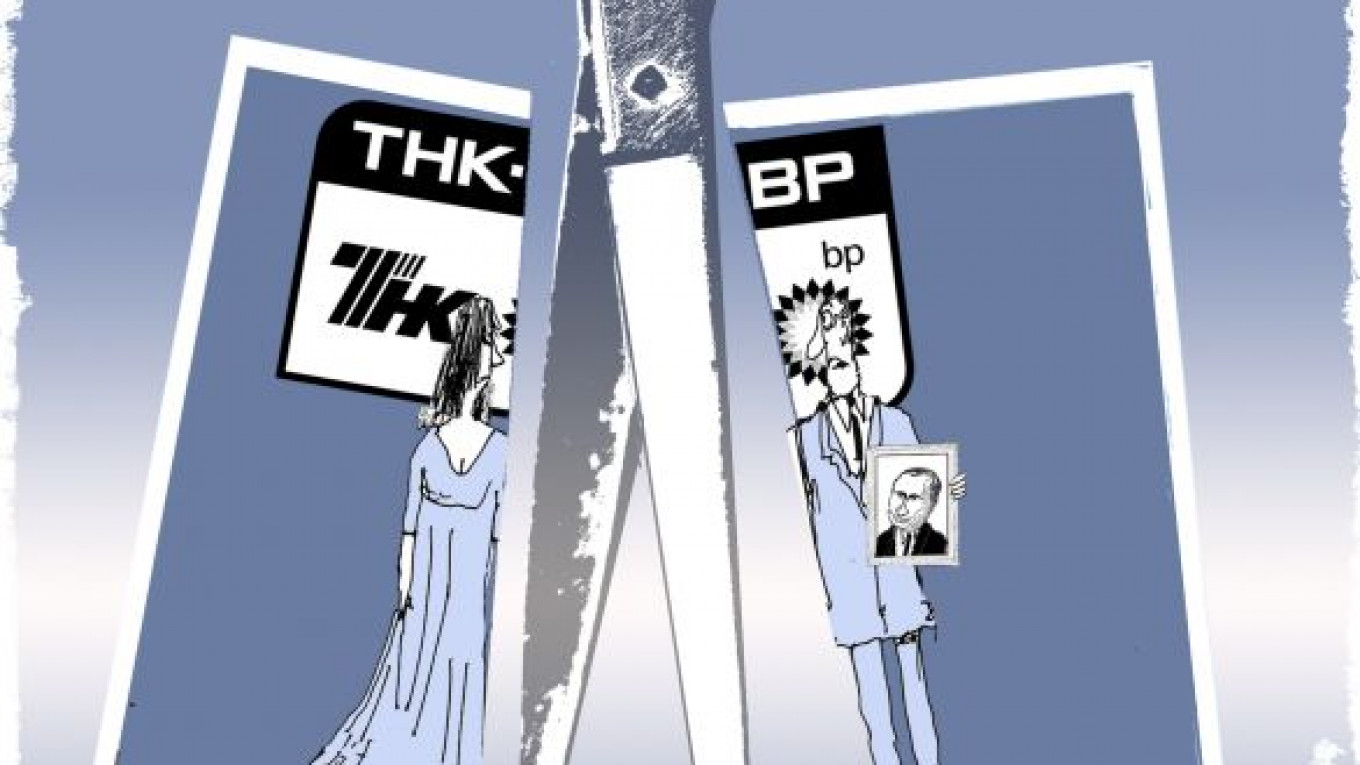BP surprised analysts Friday when it informed AAR, its Russian joint-venture partner in TNK-BP, that it would consider selling its 50 percent stake. Another surprise had come three days earlier when TNK-BP co-owner Mikhail Fridman announced his intention to resign from the joint venture. AAR, which has preferential rights to purchase BP's shares, has already announced its readiness to buy out the BP stake. The TNK-BP alliance has been plagued with serious troubles from its founding in 2003. In such cases, it is often said that a good divorce is better than a bad marriage.
Friday's announcement is just the latest chapter in a long history of internal conflicts between the two joint-venture partners. Today, TNK-BP does not even have a functioning board of directors, and the ongoing conflicts have made it difficult to agree on strategic plans for development.
At the same time, however, BP's investment in Russia has been its most lucrative in recent history. While BP invested about $8 billion to set up TNK-BP with AAR in 2003, it has reaped $19 billion in dividends since then, and the value of its stake has increased by more than four times. Moreover, after the disastrous BP oil spill in the Gulf of Mexico in 2010, it was the company's Russian partners that helped it through its financial difficulties by purchasing BP assets in Brazil and Venezuela at market prices.
The current escalation of the internal TNK-BP conflict is apparently a direct result of last year's heated quarrel, when BP wanted to enter into a partnership with state-controlled Rosneft to gain access to Russia's Arctic shelf. But AAR felt the proposed deal had violated its exclusivity agreement with BP to develop other projects in Russia and challenged the BP-Rosneft agreement in the International Court of Arbitration.
To the surprise of many, then-Prime Minister Vladimir Putin did not intervene on the side of his ally, Deputy Prime Minister Igor Sechin, who had close ties to Rosneft. Putin let the terms of the BP-AAR investment agreement determine the outcome. In the end, the BP-Rosneft deal collapsed. For his part, Sechin rejected a bid by the AAR consortium to partner with Rosneft in developing the Arctic shelf. Rosneft later formed an alliance with ExxonMobil.
Most likely, if the TNK-BP divorce is completed, it could lead to the state strengthening its control over the oil industry. Only two domestic companies have the resources to buy the BP stake, valued at $30 billion to $35 billion. One is Surgutneftegaz. Although its management structure is opaque, the company has the available funds to buy out BP's stake. The other purchaser could be Rosneftegaz, which owns 75 percent of Rosneft and 10 percent of Gazprom, and is closely linked to Sechin. Although Sechin is not a member of Prime Minister Dmitry Medvedev's new government, Putin wasted no time in signing orders that place an enormous part of the country's fuel and energy complex under his control.
Through Rosneftegaz's purchase of BP's shares in TNK-BP, the Kremlin could create a state-owned mega oil company along the lines of Gazprom, the state's giant gas monopoly. Sechin is also said to oppose the new privatization of the Russian energy sector. If Rosneftegaz expanded its market position by buying out the BP stake, it would provide yet another dangerous example of heavy government intervention in the economy and would likely spark a continuation of capital flight and a further worsening of the investment climate.
If the state is looking to increase its control over the oil industry, it will not allow AAR to snatch up the BP stake. On the contrary, the authorities will surely bring enormous pressure to bear on AAR to convince it to step aside. For example, the state has already had success in using its "environmental weapon" against BP, citing trumped-up charges of violations to force the company to pay almost $1 billion to clean up Samotlor, Russia's biggest oil field. Few in the government seemed to care that the site was heavily polluted during the Soviet period — long before BP entered the picture.
In another possible scenario, if Rosneft trades shares for the BP stake in the consortium, BP could use that roundabout approach to finally obtain its coveted access to the Arctic shelf through some form of partnership with Rosneft.
In any case, by announcing its readiness to leave the partnership with TNK, BP has showed how fed up it is with the problems of working in Russia's difficult business environment. At this point, state intervention in the deal is inevitable. Knowing this, it would make sense for BP to negotiate directly with the country's leadership. If BP plays its cards right, one visit to President Putin's office could be enough to solve all of its problems.
Georgy Bovt is a political analyst.
A Message from The Moscow Times:
Dear readers,
We are facing unprecedented challenges. Russia's Prosecutor General's Office has designated The Moscow Times as an "undesirable" organization, criminalizing our work and putting our staff at risk of prosecution. This follows our earlier unjust labeling as a "foreign agent."
These actions are direct attempts to silence independent journalism in Russia. The authorities claim our work "discredits the decisions of the Russian leadership." We see things differently: we strive to provide accurate, unbiased reporting on Russia.
We, the journalists of The Moscow Times, refuse to be silenced. But to continue our work, we need your help.
Your support, no matter how small, makes a world of difference. If you can, please support us monthly starting from just $2. It's quick to set up, and every contribution makes a significant impact.
By supporting The Moscow Times, you're defending open, independent journalism in the face of repression. Thank you for standing with us.
Remind me later.







